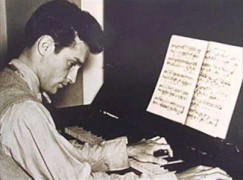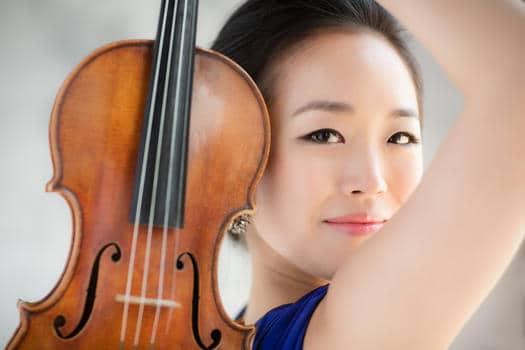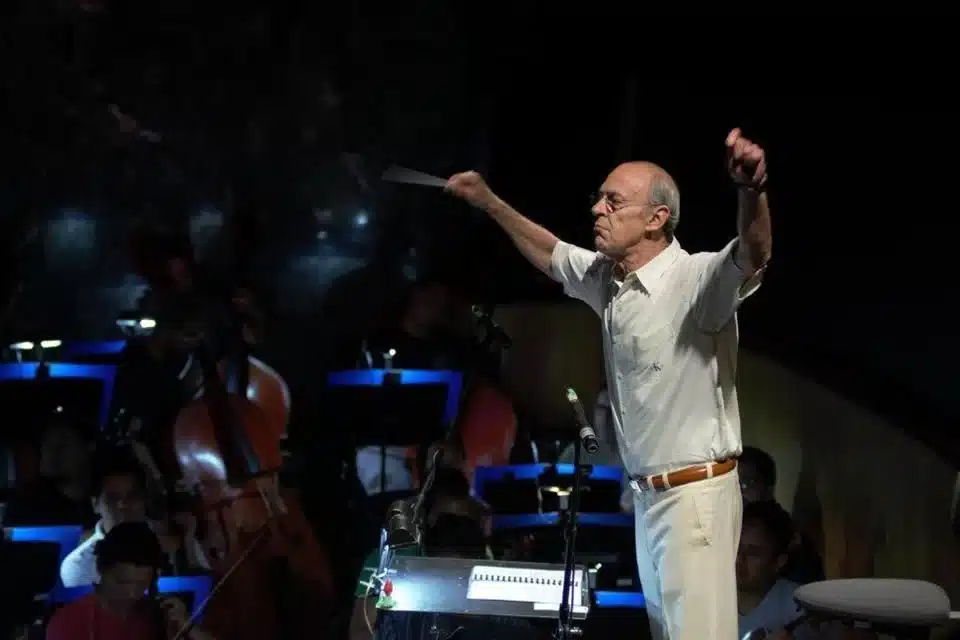America’s foremost pianist reaches 100
Daily Comfort ZoneAt the time of his death in a plane crash, aged 31, William Kapell was considered the best pianist ever to be born in America.
Born in New York on September 20, 1922, Kapell modelled himself on Schnabel and Horowitz, two pianistic antipodes.
After repeatedly riling New York’s critical cliques, he set off on a 17-concert tour of Australia from August to October 1953. Returning home, his plane crashed outside San Francisco, killing all on board.






Dead people don’t “reach” 100, they’re six feet under.
The William Kapell International Piano Competition was held at the University of Maryland (just outside Washington DC) from 1971 to 2012.
After it was discontinued, efforts resulted in a competition held in the Baltimore area, but now called the William Knabe Competition, after the Maryland piano manufacturer (1803-1864).
It was the other very best competition besides the Cliburn
Incredible tone, touch, and phrasing.
No, he didn’t reach 100. He reached 31
It’s his 100th anniversary marked by yet another melodramatic SD headline
Slow day at the races maybe.
Let the man have his small treat…..it doesn’t harm….
Leon Fleisher, a contemporary, always made a point of extolling the virtues of Kapell’s performances.
I listen most of the CDs from RCA and some lives, the poor sound does not leave me with a clear image of what how the piano was sounding….
I certainly can’t think of any American-born pianist superior to Kapell – or even one as good as he.
One of a kind, was Willy Kapell.
Byron Janis????????
Although I certainly do admire Janis, and Earl Wild (who is mentioned in another comment), I’ll stand by my statement.
How about Earl Wild?
An incredible pianist? No doubt at all. A misleading headline? No doubt at all.
You really need to leave this site if it so upsets you.
My, so sensitive a host.
It is odd to think that had he lived, Kapell would certainly have recorded well into the “stereo age” and most likely even into the digital and compact disc eras, with the result that the precious Kapell recordings and broadcasts that we treasure so much today would most likely be classed as just his “earlier version,” and thus downplayed, rather like we regard and largely ignore most of the 78 rpm versions of concertos, sonatas, and recital pieces that Serkin, Rubinstein or Casadesus remade.
I read that Kapell was flying back to the US specifically to make further sonata recordings with Jascha Heifetz. I do not believe I have ever seen the repertoire lists for those RCA Victor sessions, but the Brahms Sonata No. 3 that they did record set a high standard.
I believe that Kapell and Heifetz were going to record the other two Brahms Sonatas – G Major and A Major. Heifetz was said to have been distraught, even angry, over Kapell’s death.
I’ve heard that Heifetz was devastated by Kapell’s death. Certainly an indication of the high regard the violinist held for his fellow artist.
Subjective, certainly Van Cliburn first pianist winner or the Tchaikovsky Competition in many knowledgeable minds holds that position. Calling Kapell America’s foremost pianist today is a bit of a stretch.
Your comment is not popular but it is spot on. For whatever reason people like to wrinkle their nose at Cliburn, maybe because he burned out quickly, maybe for other reasons (coastal prejudice?), but in my mind all you have to do is listen to his live Rachmaninoff 2nd sonata from 1960. Kapell was no slouch but nothing he recorded even comes close to that performance. Richter himself, a judge at the ’58 Tchaikovksy, called Cliburn “a genius – a word I do not use lightly.”
I came along right behind Cliburn, so followed his progress. True, his winning Rachmaninoff Concerto No.2 was glorious. However, I had just received a birthday recording of Wm.Kapell’s Kachaturian Piano Concerto from North Carolina Symphony conductor, Benjamin Swalin. It was my favorite from then on, and remains so today!
Both were remarkable human beings!
Van Cliburn was a great pianist, but he did not have Kapell’s intensity, drive and excitement. However, Cliburn expressed exquisite poetry and beauty in his playing – he was more like Dinu Lipatti in that respect.
IMO Van Cliburn was in many ways Russian-composer limited. Neither Reiner nor Ormandy, in recordings, were able to induce anything of interest in the core 19th century central European concerto repertoire. My memory fails to recall anything worth repeat listening in chamber music works.
What an important entry for those of us like myself who have for whatever reasons overlooked actually listening to William Kapell play the piano. Listening to his unique interpretation of Chopin, I most definitely detect a jazz consciousness, which makes complete sense given the cultural milieu of his native New York City. It is a subtle presence that explains part of his originality, including a wondrous sense of making music in the moment, exquisitely unhurried. As someone who has recently taken to playing the piano, I am most grateful for this educational post about an important classical pianist whose playing seems to transcend genres.
http://azuremilesrecords.com/pianoimprovisationseries.html
Listening some more to Kapell, it is apparent he must have been a favorite of Bill Evans in terms of touch, dynamics, expression, and unusual attention to inner voices. Evans was a gifted classical pianist before becoming a major jazz innovator, bringing unprecedented classical elements to jazz piano. I’ll ask drummer Eliot Zigmund, who shared a love for classical music with Bill, if he can verify a fondness for William Kapell’s playing.
http://www.azuremilesrecords.com/howhighthemoon.html
Regretfully, I heard back from Eliot, and he doesn’t recall Bill Evans mentioning specific classical pianists during their years of voluminous conversations occurring mostly on long plane trips to performance venues together. Most tellingly, Eliot disclosed to me previously how Bill had a particular yen for Brahms.
My favorite trio and quartet recordings of Bill Evans are the You Must Believe In Spring and Affinity albums with the common denominator of drummer Eliot Zigmund. Thank you, Bob Longhi, wherever you are, for introducing these to me at your Lahaina abode, a perfect setting for musical magic. These two recordings share a searingly personal and transcendental spell recalling Bill’s playing on the famed Kind of Blue album. What’s the reason for this? One key element is the presence of Zigmund, who shares a marked sensitivity and focus with the poetry of cymbals and brushes that recalls Jimmy Cobb, the drummer on Kind of Blue.
One reason for Zigmund and Evans connecting so deeply has to do with their shared background of European (Western) classical music. There is a sense of mutual fascination with dynamics and color conjuring musical realms visited by Maurice Ravel, Claude Debussy, Frederick Chopin and Johannes Brahms among other composers.
Truth be told, my favorite jazz pianist has become Red Garland, who was a major influence on Bill Evans, something that has been mostly overlooked, if not by musicians of the time.
http://www.azuremilesrecords.com/Luminous_Ecstasy_the_Music_of_Bill_Evans.html
https://www.nakamuramortuary.com/obituaries/Robert-Joseph-Longhi-68749/#!/Obituary
In Tim Page’s wonderful biography of William Kapell, he quotes record producer Jack Pfeiffer, “Heifetz loved Willy. He never forgave him for dying young.” In addition to plans for recording Brahms Sonatas Nos. 1 and 2, Heifetz and Kapell spoke of recording the great trio literature with Gregor Piatigorsky. Can you imagine?
Some of us High School students were supposed to meet him after a concert when Kapell returned, but we never had the chance ! I have since bought every record I could locate of his performances. So unique! Such a tragedy for the music world and the world in common ! Kapell was a good man .